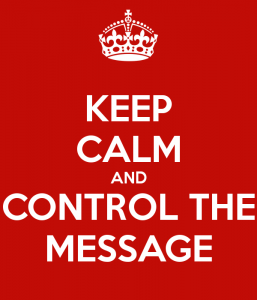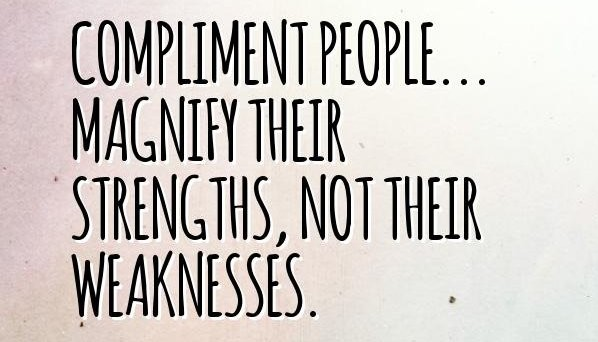
Without feedback, we live in our own bubble, unaware of how people see us. Consider this: You’re the same person at the podium that you are at the breakfast table, so whatever you learn from helpful feedback will transfer into everyday life. Think of yourself walking around a dark room bumping into furniture. Similarly, you want to know as much as you can to navigate those public speaking potholes and minefields.
Feedback is an essential ingredient of communication. Otherwise, how would you know if the “message” you’re sending is being received? Feedback can be helpful, but the timing of the feedback is critically important. I wouldn’t necessarily recommend hearing it immediately after you deliver a presentation. Take the time to catch your breath because you’re most likely non-defensive and open-hearted in that moment, and even the most constructive bit of feedback can feel hurtful. Of course, there are some situations in which you have no choice!
Here are new ways to think about the feedback you receive and how it is essential to help you improve your speaking skills:
FIND YOUR BLIND SPOT
First, consider whether the feedback is well intentioned. A friend might say, “I really lost you there, but then again, I just flew in from China and have serious jet lag.” Make sure the “sender” is being honest about why they didn’t understand your point. Were you prepared for your presentation and the particular people sitting around the table? Did you expect to be speaking to tekkies but instead found yourself facing top executives who couldn’t tell a byte from bit?
Ask yourself if being a specialist in your field leads you to use jargon and technical terms that an “outsider” or layperson wouldn’t understand. In the age of specializations, this is a common issue, leading us to connect only with our Work Tribe.
If the person providing feedback is being honest, you need to be honest too. Reward them by saying, “You know, you’re right. I get into the weeds because I love my work so much but you reminded me that not everyone understands brain research.” For example, one of my clients realized she was too emotional to discuss her daughter’s disability within a political speech. She teared up, got distracted, and lost her place. Nobody had to give her that particular feedback but as a result of our coaching sessions together, she found a way to make her point while keeping her emotions in check.
SEEK THE HARD HONEST TRUTH

Find the nugget of truth that lies within the hard edge of critical feedback. Maybe you did have too many PowerPoint slides. Maybe you didn’t “own the room” because you didn’t connect with your audience. At the pre-speech reception, did you keep your head down, reading tweets, rather than shaking hands? Maybe your nervousness made you rush through your remarks.
If someone gives you vague empty feedback, push them to be more specific. Ask them, “So, what could I have done differently?” Specific feedback about your style can be very helpful for the next time you prepare a presentation.
Think for a moment about the person offering feedback and what a gift it can be. For most people, giving feedback means taking a risk but, if your friends, colleagues, or supervisor respect you, they want you to succeed and they will tell you the honest truth. After all, what’s worse is not getting any constructive criticism and continuing to do the same problematic thing, over and over again. As a coach, I’ve learned that the real danger lies in getting no feedback about a presentation. No feedback can also be a form of feedback. People didn’t care, weren’t paying attention, or were lost.
CONTROL THE FEEDBACK
There are going to be times when you want to control the feedback by letting your friend (or colleague) know the single area in which you want feedback before your deliver your remarks. Personally, I’ve told people to let me know if my jokes, anecdotes or shocking statistics helped or hindered my presentation. I try to stay “on message” but sometimes, when I get people laughing, I have been known to take advantage of the moment and wander down the road to perfidy. I’ve heard a woman speak about sex trafficking and when she noticed the audience tear up, she kept giving more and more horrific anecdotes and, at that point, she lost them. She took advantage of their empathy but, as a result, they put away their checkbooks.

GIVING FEEDBACK AS A COACH
What about times when I’m in the “audience” role, where I am the one to provide feedback to my clients? That’s tricky as I don’t want to hurt someone’s feelings. My clients are often forced to be in a public speaking role and would rather do anything else than speak to the board or potential voters, but their new role or campaign requires it. When I give feedback, I have to pick my battles.
First and foremost, I remind my clients about the purpose of the presentation. “What’s the point?” In planning the presentations together, we make them as lean-and-mean as possible and then add richness back in by way of concrete examples, anecdotes, and evidence. We always end with a summary of the main points and finally, construct a great punch line that keeps people thinking. With this approach, my clients never get feedback that people in the audience were left wondering what the point was.
There are times I don’t offer feedback because of my affection or respect for the speaker. For instance, my older feminist friends still rant about Hillary’s decision to stick with Bill as the main reason they remain mad at her (though they still voted for her). There are times when my academic friends are excited about a student’s success but they go on too long and lose me in the backstory. My scientist friends talk about global warming in a way that leaves me at the base of Mt Everest. I decide when to zipper my lip because friends are sharing something meaningful and I love them. I don’t want to rain on their parade and in the long run, my feedback won’t mean much anyway.
SUGGESTIONS FOR GIVING FEEDBACK
If you want to give feedback to a friend or colleague, make sure they want it by asking them in advance if they do, and if so, what to concentrate on. After the presentation, write down ONE suggestion on a note card with an “Atta Girl!” comment at the end complimenting them on what they did well. Be specific: “You smiled in all the right places!” or “I could easily follow your logic and your argument!” or even “You inspired me to do something about those potholes!” Too many criticisms can feel overwhelming after a presentation and the speaker will appreciate knowing what she did well.
Giving good criticism can be a bit of an art form to ensure you’re being helpful and not hurtful. Sample criticisms include:
- “I loved the topic but it didn’t relate to our growing company as we struggle with personnel matters. Could you give a few concrete examples to bring it down to our level?”
- “You connected with us when you made eye contact but were tied to your notes too much of the time. Trust yourself! You know this topic better than any of us!”

WHY FEEDBACK IS IMPORTANT
Here’s the honest truth, something your mother never told you. First, not everyone will love you, nor will they automatically love what you say or how you say it. That will help you Get Real when it comes to expectations of unconditional love from strangers (or even friends). Second, not everyone is tactful. Third, some people may be jealous that they’re not at the head of the room leading the way. Others may have a superiority complex or a hidden agenda. I bet the latter group are the people who withhold feedback because they don’t mind if you fail.
I propose that there is always at least one grain of truth to be found in critical feedback, even when it hurts. At those moments when you really want to say OUCH! you’re wiser to bite your lip. Find the gold nuggets – the specific behavioral feedback the can help you improve. Try saying, “I appreciate your honest feedback. it will really help me grow as a speaker.” Taking the high road means you have the aerial view, and that’s where leaders stand.